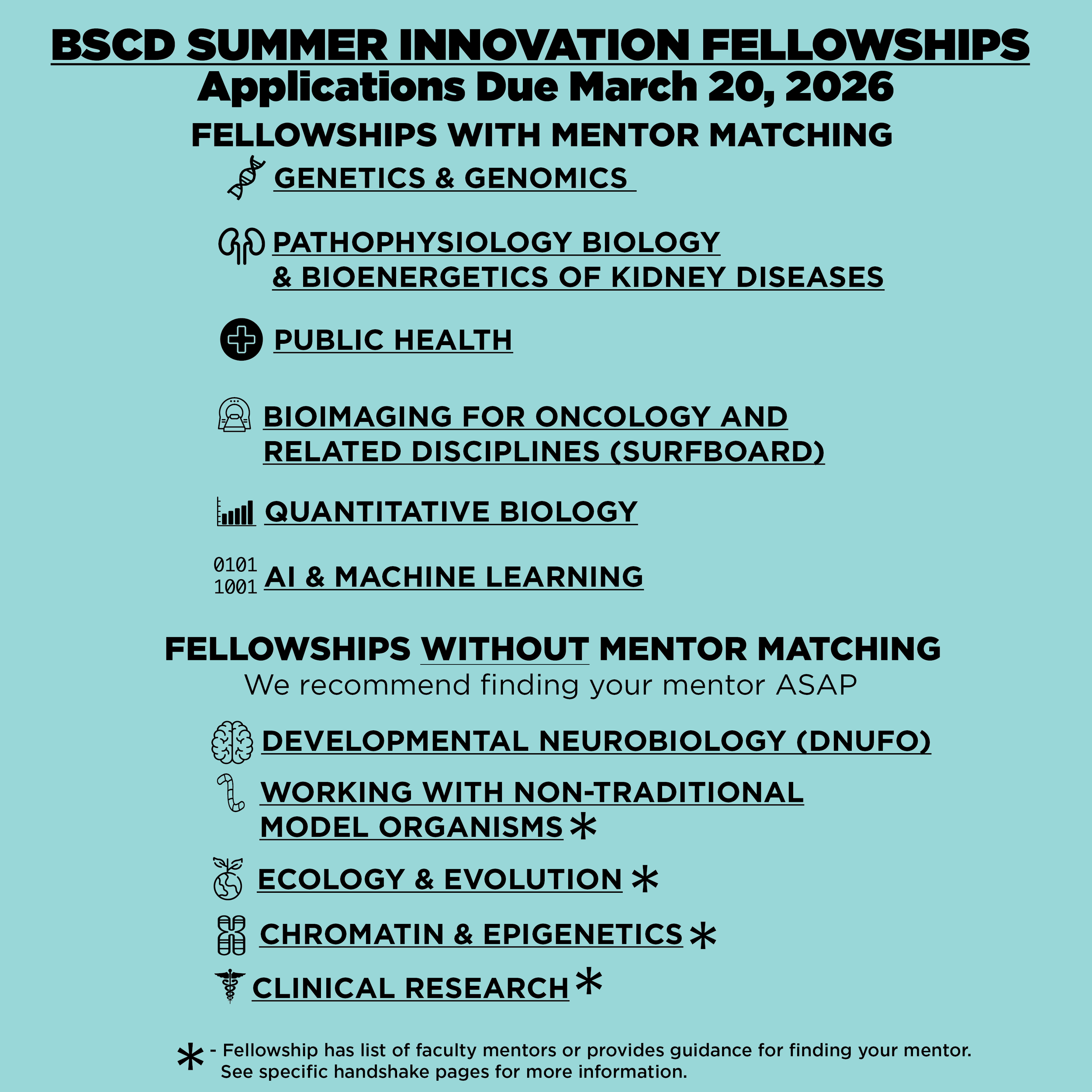BSCD SUMMER INNOVATION FELLOWSHIPS
The BSCD Summer Innovation Fellowships consist of thematic research programs in a variety of fields. For some fellowships, you apply with an identified research mentor and project, and for other fellowships you are matched with a mentor and project.
Complete program descriptions and application instructions for each individual program will be available on Handshake - use the links below!
For more information: Sunny Han (sunny.han@uchicago.edu)
Applications will be released soon! Check back in December!
-
The Developmental Neurobiology Undergraduate Fellowship Opportunity (DNUFO) is a 10-week summer program designed to facilitate rigorous, full-time research, build networking opportunities, gain professional development skills, and expose students to research outside of their immediate interests.
-
The Chromatin & Epigenetics Undergraduate Research Fellowship provides an immersive research experience to learn cutting-edge methodologies and develop analytical skills towards discovery in the field of epigenetics.
-
The Research Foundations in Genetics and Genomics Program provides early-stage undergraduate researchers with an opportunity to gain hands-on training carrying out a novel research project under the mentorship of UChicago research labs. In addition, students gain foundational skills in analyzing and presenting primary scientific literature, communicating with peers and the scientific community and attending weekly research seminars with scientific leaders from around the world, all in small group settings meant to maximize interaction between participants and researchers.
-
This fellowship supports undergraduate summer research outside mainstream model systems research. Organismal diversity provides a rich and largely untapped resource to study biological mechanisms from gene regulation and development to biophysics and biomechanics to behavior and neural networks. However, most laboratory research remains focused on a small number of conventional experimental systems. The goal of this fellowship is to encourage budding scientists to take advantage of these new opportunities. Students will work in lab at the University of Chicago campus or at the Marine Biological Laboratory (MBL) at Woods Hole on the Atlantic coast and will present their research at an undergraduate research symposium at MBL.
-
A summer fellowship to allow dedicated time to explore and understand the physiology and metabolism of the kidney in health and disease.
Pathophysiology, Biology, and Bioenergetics of Kidney Diseases Fellowship Application
-
The Collegiate Translational Medicine Program (CTMP) is a mentored, clinically-oriented translational research experience for undergraduates, offering training in translational research by exposure and immersion into specific research projects currently being conducted in the Department of Medicine.
-
The BSCD Undergraduate Summer Fellowship in Public Health Research aims to provide undergraduate students an immersive research experience through close interactions with faculty in the Department of Public Health Sciences and their research projects. Student projects focus on interdisciplinary topics that bring biostatistical, quantitative and qualitative methods to improve understanding of complex problems in population health.
-
SURFBOARD is an interdisciplinary summer research program in biomedical imaging with applications in oncology, neuroscience, and beyond.
-
The BSCD Ecology & Evolution Summer Fellowship gives students the opportunity to explore their interests in a broad range of field and laboratory settings. Note - the Ecology and Evolution Fellowships are aimed at students interested in the Ecology and Evolution Track.
-
BSCD Quantitative Biology fellowship combines research using computational methods into a range of biological problems with a collaborative environment for learning new skills and concepts.
-
The emergence of Machine Learning (ML), Artificial Intelligence (AI), and recently large language models (e.g.: generative AI) in healthcare has been groundbreaking, reshaping the way we diagnose, treat, and monitor patients. AI is drastically improving healthcare research and outcomes by producing more accurate diagnoses and enabling more personalized treatments. The primary objective of this program is to educate a cohort of undergraduate students in the Biological and Physical Science Divisions, offering them both training and an immersive and interdisciplinary research experience in AI and ML with a specific application in biological and health sciences.
-
Undergraduate students will gain hands-on experience in medical research by joining a clinical research team to support day-to-day activities. This is an opportunity to assist with real studies involving human health, working alongside professionals in data collection and analysis. This is an invaluable opportunity to contribute to healthcare and research. Opportunities for conferences and journal clubs also exist. Students are expected to work 40 hours/week.

